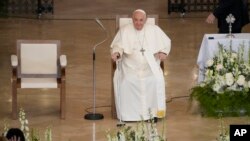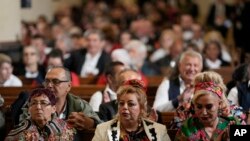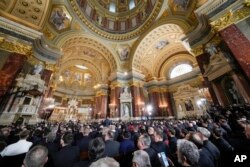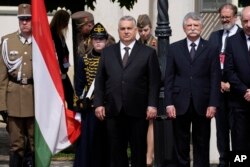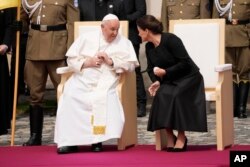Pope Francis met with refugees and impoverished people Saturday at St. Elizabeth’s Church, a white brick church in Budapest, on the second day of his three-day visit.
St. Elizabeth was a Hungarian princess who renounced her wealth to dedicate her life to the poor.
Francis used the occasion to remind the Faithful of their Christian duties to show love and compassion to all.
Europe is experiencing a migrant crisis with hundreds of people from Africa and the Middle East arriving almost daily.
Hungarian Prime Minister Viktor Orban has said that migration threatens to replace Europe’s Christian culture.
Europeans have not always been charitable or receptive to these migrants, but they have been more accepting of the Ukrainians who fled their homes after the Russian invasion.
Francis is set to attend a youth rally Saturday at a sports stadium.
On Sunday, he will preside over an open-air Mass at Pázmány Péter Catholic University in Budapest.
Pope Francis pointedly warned Friday of the dangers of rising nationalism in Europe and told the Budapest government that accepting migrants along with the rest of the continent would be a true sign of Christianity.
In a hard-hitting speech to government leaders — including Prime Minister Orban, who has had a series of run-ins with the European Union — Francis also urged a rejection of "self-referential forms of populism" and strictly nationalist interests.
Francis called for a return to the "European soul" envisioned by those who laid the groundwork for modern Europe after World War II, saying nations had to "look beyond national boundaries."
Speaking on the day that Kyiv vowed an "iron fist" response after Russia hit Ukraine with the first large-scale airstrikes in nearly two months, Francis made another appeal for an end to the war there, calling for "creative efforts for peace" to drown out the "soloists of war."
The three-day visit is the 86-year-old pope's first trip since he was admitted to the hospital for bronchitis in March.
Looking cheerful, Francis, who has a knee ailment, used a cane to walk by welcoming dignitaries and children in national dress at the airport. In recent arrivals, he used a wheelchair.
Asked by reporters about his health on the flight from Rome, the pope joked, saying "I'm still alive" and "stubborn weeds never die."
Francis is keeping a promise of an official visit to Hungary after a stop of only seven hours in 2021 on his way to Slovakia that left many feeling slighted.
Orban, 59, and the pope have differing views on handling migration from the Middle East and Africa, with Francis believing migrants fleeing poverty should be welcomed.
Orban, whose government built a steel fence on the border with Serbia to keep out migrants, has refused to let Hungary be transformed into an "immigrant country" like he says others in Europe have become.
He asked Francis in 2021, during the pope's last visit, "not to let Christian Hungary perish."
Hungary's founder saint
After separate private meetings with President Katalin Novak and Orban, Francis gave a speech in the presidential palace overlooking the River Danube, in which he quoted St. Stephen, the 11th century founder of Christian Hungary.
"Those who profess themselves Christian, in the company of the witnesses of faith, are called to bear witness to and to join forces with everyone in cultivating a humanism inspired by the Gospel and moving along two fundamental tracks: acknowledging ourselves to be beloved children of the Father and loving one another as brothers and sisters," Francis said.
"In this regard, Saint Stephen bequeathed to his son extraordinary words of fraternity when he told him that those who arrive with different languages and customs 'adorn the country,'" Francis said, quoting the saint's command to "welcome strangers with benevolence and to hold them in esteem."
But Francis appeared to give comfort to Orban's rejection of the imposition of what he says are liberal values by outsiders. Francis denounced any form of "ideological colonization" on issues such as "so-called gender theory" or "the right to abortion."
Later, addressing bishops, priests and nuns in St. Stephen's Cathedral, Francis urged Hungarians to confront "the rapid pace of social change and the crisis of faith affecting our Western culture."
Orban, who has said that Hungary and the Vatican are the only two European states that can be described as "pro-peace," later posted on his official Facebook page that the pope's words were a "confirmation" of Hungary's desire for peace in Ukraine.
Hungary supports a sovereign Ukraine but still has strong economic ties to Russia. Orban's government has refused to send weapons to Ukraine. The pope has said sending weapons to Ukraine for self-defense is morally permissible.
Some information in this report came from Reuters.




